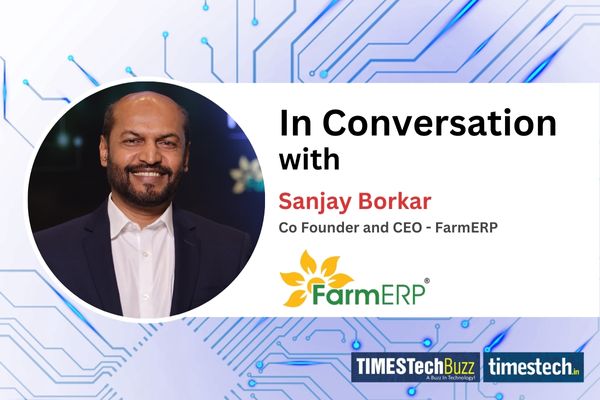In an exclusive interview with TimesTech, Sanjay Borkar, Co-Founder and CEO of FarmERP, discusses how AI, ML, and blockchain technologies integrated into the FarmERP platform are transforming global agribusiness by enhancing productivity, predictability, and profitability, while promoting sustainability and climate resilience.
Read the full interview here:
TimesTech: How do AI, ML, and Blockchain, combined with FarmERP’s platform, revolutionize global agribusiness for increased productivity, predictability, and profitability?
Sanjay: The new-age technologies have revolutionized industries by enhancing human intelligence and processing extensive datasets. FarmERP platform leverages AI and machine learning to provide agribusinesses with insights into weather patterns and predictions for resource requirements, promoting climate-resilient agricultural practices. Additionally, the platform enhances data accuracy, security, and consistency across the supply chain through blockchain traceability, enabling agribusinesses to easily trace back agricultural products and make informed decisions in the event of recalls.
TimesTech: In your opinion, how has technology contributed to the recent growth in India’s agricultural and processed food products exports?
Sanjay: In recent years, India has become a significant player in the global export scene for agricultural and processed food products, securing a spot among the top fifteen exporters worldwide. With digitalization becoming a key part of agriculture, operations have become smoother across the entire value chain, from planning harvests to certification and export. This blend of technology and digitalization has created exciting new opportunities for agribusinesses in international markets. FarmERP’s technology-driven platform plays a vital role in this journey, offering insights into container loading, shipping, and even consumer traceability, ensuring a hassle-free export process for farmers and businesses alike.
TimesTech: Could you share FarmERP’s approach to digitizing 10 million acres globally in the next 2 years and the emphasis on climate-intelligent technology during this expansion?
Sanjay: FarmERP’s plan to digitize 10 million acres globally within the next two years is a significant move in advancing agricultural technology. This ambitious goal is part of our broader mission to revolutionize agriculture through digital solutions that enhance predictability, productivity, and profitability for farmers.
The approach involves leveraging a comprehensive suite of digital tools that encompass the entire agriculture value chain. A key aspect of FarmERP’s strategy is its emphasis on climate-intelligent technology. This involves utilizing advanced data collection and analysis to optimize the use of water, nutrition, fertilizers, and pesticides, thereby mitigating the risks associated with climate change. For instance, our technology helps manage irrigation more efficiently in water-scarce regions by providing tailored advice based on real-time weather conditions and soil data.
This digitization effort not only aims to enhance the efficiency and sustainability of large-scale farming operations but also extends support to smallholder farmers through tailored advisory services and outreach programs. These initiatives are designed to increase farmers’ resilience to climate variability and improve overall farm management practices.
TimesTech: How have features like Climate Smart Advisory, IoT integration, and QR-based access control impacted FarmERP’s success in enhancing yields, efficiency, and profitability?
Sanjay: FarmERP’s journey towards enhancing yields, efficiency, and profitability is deeply rooted in features like Climate Smart Advisory, IoT integration, and QR-based access control. The innovative approach has significantly contributed to improving agricultural productivity. Through our Farmgyan offerings, powered by AI and ML, we provide invaluable weather insights, empowering growers to make informed decisions in crop management and optimize resource allocation. Together, these features embody FarmERP’s commitment to transforming agriculture, resulting in increased yields, efficiency, and profitability.
FarmERP’s success in enhancing agricultural yields, efficiency, and profitability can be attributed to several key features, including Climate Smart Advisory, IoT integration, and QR-based access control. These innovations have transformed farm management practices by leveraging data-driven insights and advanced technologies.
Climate Smart Advisory plays a critical role in mitigating the impacts of climate change on agriculture. By utilizing AI and machine learning, FarmERP provides tailored advice on irrigation, fertilization, and pest control based on real-time weather data and predictive analytics. This approach helps farmers optimize resource use, reduce waste, and enhance crop yields. For instance, in water-scarce regions, precise irrigation scheduling based on weather forecasts and soil moisture data can significantly improve water use efficiency, leading to better crop health and higher yields.
QR-based access control is another innovative feature that enhances the traceability and accountability of farm operations. By using QR codes, FarmERP ensures secure and easy access to critical farm data and management tools. This feature is particularly useful for managing large-scale operations and ensuring that all stakeholders, from field workers to managers, have access to the information they need. QR codes can be used to track and manage the movement of goods, monitor compliance with safety and quality standards, and streamline supply chain processes. This level of traceability and transparency helps in reducing losses, improving product quality, and boosting profitability.
TimesTech: What specific strategies does FarmERP employ to align with UN Sustainable Development Goals, particularly Zero Hunger and Climate Change, in terms of food safety, traceability, sustainability, and climate resilience?
Sanjay: At FarmERP, we’re committed to supporting the United Nations’ Sustainable Development Goals, particularly Zero Hunger and Climate Change, through our dedicated efforts in digital farming and sustainable agriculture. Our platform is designed to enhance overall efficiency while placing a strong emphasis on food safety and sustainability. As proud members of GLOBAL G.A.P and the Sustainable Rice Platform, we adhere to rigorous standards of responsible agricultural practices, actively contributing to a more sustainable and secure food future. By integrating aggrotech solutions, we address Zero Hunger by ensuring food safety across the supply chain and promoting climate resilience. Through these initiatives, FarmERP plays a vital role in guiding the agriculture sector toward environmental and social responsibility, making a positive impact on communities worldwide.
TimesTech: How does FarmERP’s digital infrastructure address daily challenges for the global farming community, and how does the platform continuously evolve to improve the agricultural supply chain?
Sanjay: At FarmERP, we’re dedicated to supporting the global farming community by tackling their daily challenges through a comprehensive suite of smart, scalable digital solutions that span the entire agriculture value chain. From farming to procurement, processing, supply chain management, financial oversight, and data-driven analytics, our platform covers it all. By embracing Digital Agriculture 4.0, we empower stakeholders to adopt profitable and sustainable agribusiness practices. Our end-to-end, smart, and data-driven approach supports strategic decision-making across various facets of agriculture, from procurement to export. Whether it’s grower reporting, quality control, food traceability, or exports, FarmERP continuously evolves to meet the dynamic needs of the agricultural supply chain, ensuring efficiency, transparency, and resilience every step of the way.

















